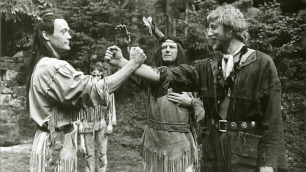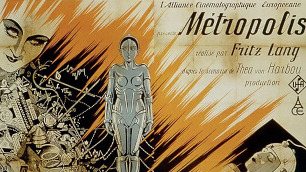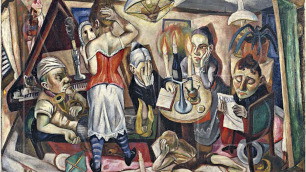| Jana: | Willkommen! Wir werden heute viel lernen. We are going to learn a lot today. Or to incorporate what we learned last time: Wir möchten viel lernen… we would like to learn a lot! |
| Michael: | How about: Wir können viel lernen! We can learn a lot, especially since we said that this is a course you can’t fail! |
| Jana: | Vielen Dank, Michael. I forgot to ask… How are you? |
| Michael: | Alles gut! |
| Jana: | All is well! That’s an expression we can use as both a question and answer: Alles gut? |
| Michael: | Ja, alles gut! Fangen wir an? |
| Jana: | Oh, and once again you’ve given me the perfect introduction. |
| Michael: | Danke! I’m flattered, but what did I say? |
| Jana: | Anfangen is a separable verb, as we already learned, so the “an” appears at the end. But today we will introduce inseparable verbs. These are verbs with set prefixes that stay in place at all times. |
| Michael: | OK… How about we think of them as being… policed? They must stay where they are! |
| Jana: | Or… How about they are in love? They are just inseparable! We could refer to Goethe – Johann Wolfgang von Goethe, der beliebte deutsche Poet. Sorry, the beloved German poet, whose main characters were often inseparable. |
| Michael: | Oh ja, viel besser, much better! People often think of the Germans as very stiff people because of our past, but they may not know that we have a very romantic side, too! |
| Jana: | Richtig. And some people say, we have a “lego language”, but I prefer to say the German language is like a form of art, where you can add a new prefix and the meaning changes. |
| Michael: | Ich verstehe, I understand! We talked a little bit about this in Episode 2. |
| Jana: | Genau. And verstehen is another great example for an inseparable verb. Stehen means to stand... |
| Michael: | And verstehen means to understand. |
| Jana: | And missverstehen means to misunderstand! We will see that the same prefixes occur with different verbs. For instance ver- and miss-, ge-, ent-, er- and be-. |
| Michael: | Oh, I have another great one: Kommen means to come. If you add be- to this verb, it changes to bekommen, which means to receive. Er bekommt gute Nachrichten, he receives good news. |
| Jana: | Sehr schön! Very nice! And we could add yet another prefix here, wieder-, which means again. |
| Michael: | Like in Auf Wiedersehen! |
| Jana: | Genau! Yes, exactly! To see each other again. And wiederbekommen means to get something back again. In one of our news stories we had this sentence: Der Tourist bekommt seine gestohlene Armbanduhr wieder. The tourist gets his stolen wristwatch back. |
| Michael: | Oh, and if you add the prefix ent-, the meaning changes again: entkommmen means to get away! |
| Jana: | Great example. Some prefixes always have the same meaning – ent- always indicates that something is taken away. Entkommen means to escape, to avoid capture. Der Dieb ist der Polizei entkommen. The thief escaped the police. Here’s a similar example: gehen means to go, or walk. One way to translate entgehen is to avoid or get away from something. Der Dieb entgeht der Strafe. The thief avoids punishment. |
| Michael: | You know, all these sentences sound like part of an adventure tale… Hmm, since the whole world already knows about Goethe, how about we talk about another writer? One who created adventurous stories. |
| Jana: | Gute Idee! Storytelling is a great way to use a lot of these prefixes. We can add another new verb here, erzählen, to tell a story. Du erzählst eine Geschichte. |
| Michael: | Me? No, I meant an actual writer. Can you think of a good German storyteller? |
| Jana: | How about someone who was one of the best-selling German authors of all time, whose work has been translated into many languages, and who is well known for popular film adaptations in Germany? |
| Michael: | Hmm. Kannst du mir helfen? Can you help me? |
| Jana: | His first name is Karl. |
| Michael: | Karl Marx? |
| Jana: | Well, Karl Marx is widely known, but this not-so-well known author sold more books than him! Oh, I just used verkaufen, to sell. Kaufen means to buy, and verkaufen means to sell. Er verkauft viele Bücher. He sells many books. |
| Michael: | OK, viele Autoren verkaufen viele Bücher. I need a real hint! |
| Jana: | How about this: He wrote a lot of stories about the Wild West, even though they were mostly fabricated. |
| Michael: | Oh natürlich! Karl May! Didn’t he get his information from reading books while he was in jail? And I know that nowadays his stories are seen as pretty stereotypical, but I loved Winnetou, the Apache hero, especially when they created the show for TV. |
| Jana: | Korrekt! He wrote about fantastic travels in the Middle East and the Wild West. He got a few ideas from travel reports he found at the prison library during his four years there, and used them as the foundation for his stories. |
| Michael: | Many authors do that. Sie bearbeiten die Geschichte. They edit the story. |
| Jana: | Another great example: Arbeiten means to work, bearbeiten means to edit. But he edited and added quite liberally. |
| Michael: | Well, in all fairness, there were no representatives of the Apache tribes around to correct him. Why did he end up in jail, anyway? |
| Jana: | One could say he had a different approach to life, reinterpreting reality, which ultimately turned him into a con artist. |
| Michael: | Wow, OK, another sentence for our listeners: Er reinterpretiert die Realität. And these are direct cognates – he reinterprets reality. |
| Jana: | Danke, Michael! Born in 1842, he grew up very poor and wanted to become a teacher. However, he was jailed twice for stealing, and so he lost his teaching license. He then posed as an eye doctor, a policeman, among others, and he ordered fur coats he never paid for. |
| Michael: | That makes sense, he did have a vivid imagination, and he enjoyed telling stories from a different perspective… Hmm, another useful verb comes to mind: Erfinden! Finden means to find, erfinden to invent. Karl May erfindet den Wilden Westen. Karl May invents the Wild West. |
| Jana: | And one of his most famous characters was the noble chief Winnetou. To use our new storytelling verb I mentioned earlier: Karl May erzählt die Geschichte von Winnetou. Karl May tells the story of Winnetou. |
| Michael: | Oh, and once again we can take it apart just like legos: Zählen means to count, and erzählen, to recount, as in recount a story! By the way, we can’t mention Winnetou without mentioning Old Shatterhand, his German blood brother. |
| Jana: | Good point. Old Shatterhand was basically Karl May’s alter ego. He even took pictures in a custom-made cowboy outfit. |
| Michael: | OK, let’s get back to the stories. My favorite part is… |
| Jana: | Hold on, before we get into the stories, let’s introduce another verb: erleben, to experience. |
| Michael: | Oh, sehr gut! Once again, we can take that apart: Leben means to live… |
| Jana: | … and erleben means to live through an experience. |
| Michael: | Winnetou und Old Shatterhand erleben ein Abenteuer, they are experiencing an adventure… Do you remember how Old Shatterhand was a surveyor for a railroad company at first, and then had to earn his friendship by doing heroic deeds? |
| Jana: | OK, Michael, rather than hearing this part, I’d like to know what you think was the reason so many people fell in love with these stories. After all, our parents' generation loved these books like we love Harry Potter. The so-called Cowboy Club in München was founded in 1913 and to this day, there are thousands of hobbyist clubs, schools encouraging playing “cowboys and indians”, … which is a little embarrassing I think. |
| Michael: | Hey, wasn’t there a song? Ich erkenne die Wörter, I recognize the words. |
| Jana: | Oh, erkennen is another useful example. Kennen means to know, and erkennen to recognize. But which song are you talking about? |
| Michael: | “Wir spielen Cowboy und Indianer''. We play Cowboys and Indians. I remember this was a hit at the Karneval in 2008. |
| Jana: | That makes me cringe. It’s hard to believe there are still places where they dress up in native garb… |
| Michael: | Hey, I actually visited the Karl May Festival in Bad Segeberg in Norddeutschland and it was very original. Oh, wait, another inseparable verb, besuchenv: Suchen means to search, and besuchen, to visit. Ich besuche das Festival. I visit the festival. |
| Jana: | OK, I can tell you are a huge fan. But can you understand the criticism? Verstehst du die Kritik? Both in his time, as well as today, his legacy is being questioned because he didn't go to America until many years later! And even then, he only went to Massachusetts and New York, not to the places he had described in his books. So, he just reproduced stereotypical images. |
| Michael: | Moment! We can translate that! Er reproduziert stereotype Bilder. Another cognate: Produzieren means to create, and reproduzieren means to reproduce. |
| Jana: | Gut, danke. But these stereotypes informed our thinking about Native American tribes in German-speaking countries. I personally think schools should stop promoting these stereotypical games and songs. We are not the only ones by the way; the U.S. have similar questions to tackle. Schools educate us. Schulen erziehen uns. |
| Michael: | Wait, we can separate that again: Ziehen means to pull, and erziehen to educate. But where are you going with all of this? Are you suggesting these books be banned? |
| Jana: | Nein! On the contrary, I would like to see more context, an expansion to different perspectives in history, including oppressed and colonized groups. What do you think? |
| Michael: | Well, I think of Karl May like we think of Sigmund Freud. He was a man of his times! You can’t throw the baby out with the bathwater, because his stories had great wisdom. For instance, Winnetou is very generous and noble, he communicates important values… |
| Jana: | And we can say that in German, too: Er kommuniziert wichtige Werte. |
| Michael: | Danke, und er will Gerechtigkeit für alle, he wants justice for all. And he is always truthful! Old Shatterhand was peaceful too, and only killed if absolutely necessary. He would rather punch someone in self defense than actually shoot them. |
| Jana: | Another verb we can fit in here: Schießen means to shoot, while erschießen means to shoot someone dead. |
| Michael: | Ach nein. Should we teach this vocabulary? Besides, it makes the story sound awful! |
| Jana: | Well, to be honest,… unfortunately we do have to use that verb in our news section sometimes. |
| Michael: | But Karl May was an outspoken pacifist. He always portrayed his heroes as only using violence in self defense. They would rather hit someone, or injure their limbs as a last resort, than kill them. |
| Jana: | Das ist wahr, that is true! And speaking of his pacifism: It’s hard to believe that Hitler was a huge fan and even attended Karl May’s last speech. Unfortunately, he never actually understood Karl May’s view of humans as being equal like brothers and totally missed his repeated calls for peace. |
| Michael: | Let’s talk about people who did get him. Even Albert Einstein belongs to the fans! |
| Jana: | Wunderbar! We can translate that again: Albert Einstein gehört zu den Fans! And to continue our favorite game: Hören means to hear, gehören, to belong. |
| Michael: | Hm, I feel that there are a lot of verbs with ge-. What’s the rule again? |
| Jana: | Oh, danke! I needed this reminder: The prefix ge- will also be introduced again later on to form the past tense of a lot of verbs, so that will be an entirely separate lesson. |
| Michael: | And once again, without doing any hard work, we learned a lot of new words today! |
| Jana: | This is maybe a good moment to remind our listeners to always go over the grammar lesson and the quiz to practice what we’ve learned! |
| Michael: | Danke, Jana! |
| Jana: | Bis zum nächsten Mal, see you next time! |
| Michael: | Tschüss! |

























